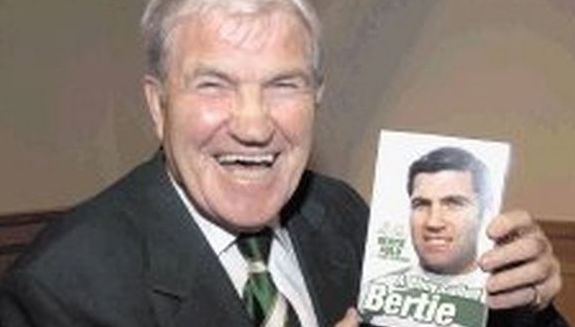IT’S Day Six of CQN’s celebrations of Lisbon Lion Bertie Auld’s 82nd birthday on Monday.
The Hoops legend has lifted the lid on Parkhead during the days of iconic manager Jock Stein as he made his mark on the club and transformed them into winners.
Today, in another EXCLUSIVE extract from Auld’s autobiography, ‘A Bhoy Called Bertie’, co-authored by Alex Gordon, the club great reveals when some players realised their Celtic careers were over.
I HAD a fair idea of what to expect when Jock Stein arrived. I knew of his desire to be successful, his determination to win things at this club. His ruthlessness in pursuit of silverware was legendary.
Second was nowhere to this guy. Any player who didn’t match up to his expectation levels soon found themselves plying their trade elsewhere.
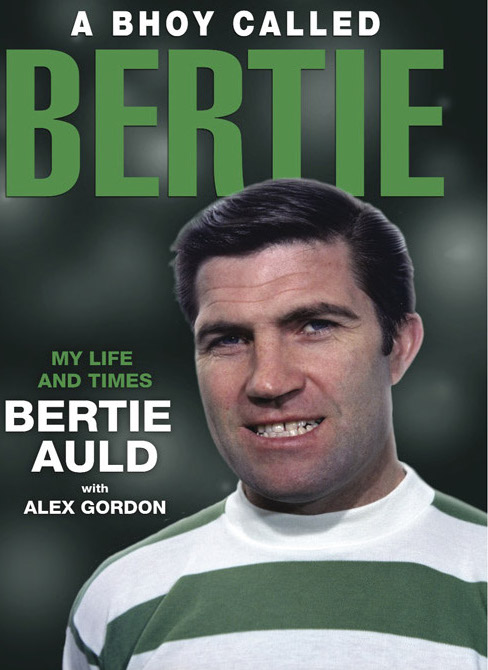
Take Hugh Maxwell, for instance. He had been bought by Jimmy McGrory from Falkirk for £15,000 in November 1964. He was an old fashioned inside-right with a nice touch, but, to be honest, he was a bit on the frail side. Jock played him twice and, unfortunately for Hugh, Celtic lost both games – 4-2 to Hibs at Parkhead and 5-1 to Dunfermline at East End Park. That was the end of his Celtic career. He was on his bike to St.Johnstone for £10,000 in the summer.
Johnny Divers got similar treatment. He was a more than useful inside-right with a lot of skill. He started in the first team in 1957, played over 200 games and scored something in the region of 100 goals. Not bad going at all, but Jock thought otherwise. Johnny has admitted he had a conversation with Jock shortly after his return from Hibs and agreed he may have lost a bit of his enthusiasm.
Jock immediately said, ‘Then you’re no use to me.’ Poor Johnny. He played against Rangers in a league match at Ibrox early in the season and missed a good chance near the end with us losing 2-1 and trying desperately to get back into the game. If memory serves correctly, Caesar nodded the ball down into his path and it looked a goal all the way. Johnny swung his boot at it, but the ball bounced awkwardly and he connected with fresh air. The opportunity was gone and the game was lost. Jock, as you will discover later, absolutely abhorred losing to Rangers. He was far from impressed.
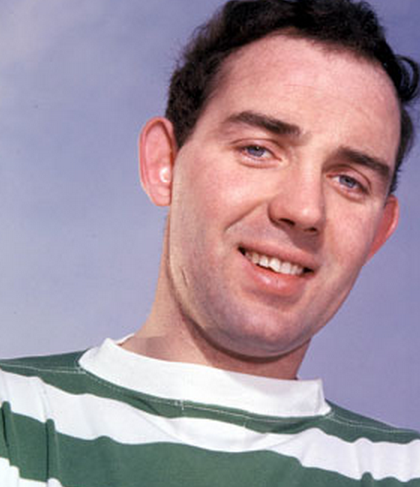
ON HIS WAY…Johnny Divers fell foul of Jock Stein.
It was then, I believe, he had his conversation with Johnny and, there and then, the player could have packed his bags and quit the club. He trained on his own for about three months and was then injured in training when Willie O’Neil accidentally stood on his foot. That was his season wrecked.
He knew his time at Celtic was over when he picked up a newspaper and there was the story informing everyone that he was to be given a surprise free transfer. Well, it would have been more of a shock than a surprise, I would think.
There must be better ways of discovering you’re on your way. However, that was typical of Jock. Personalities meant nothing to him. He wasn’t interested in popularity contests. It was all about Celtic and the players he believed could do a job for the club. You might have questioned his methods, but what wasn’t up for debate was his success.
Johnny, by the way, gave up football altogether shortly afterwards following a spell at Partick Thistle and John Clark remembers spending part of his £1,500 European Cup bonus on a car from Johnny’s salesroom in Bearsden!
Of course, there was a warmth about Jock, but if you crossed him you knew you were in serious trouble. He could be vigorously protective of an individual if he believed the situation warranted it. But he could be more than robust in his criticism if he thought it was deserved. I don’t think he ever forgave Big Yogi, John Hughes, for missing a wonderful opportunity right at the start of extra-time in the 1970 European Cup Final against Feyenoord with the score balanced at 1-1. He and Willie Wallace were sold to Crystal Palace a year later.
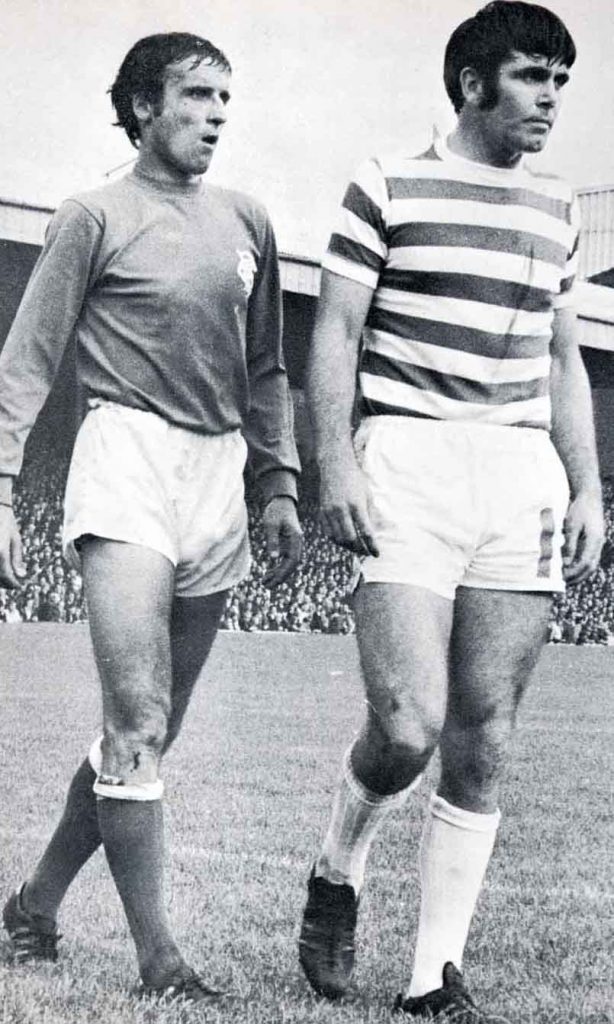
ME AND MY SHADOW…John Hughes is closely guarded by Rangers defender Ronnie McKinnon.
I know Yogi, in particular, didn’t want to go. Jock simply informed him, ‘You’ve no choice – you’re going.’ Yogi was only twenty-eight at the time and reluctantly accepted it was all over at Celtic. He went to Palace, but clearly his heart wasn’t in it. I think he lasted about eighteen months in London and then had a short spell at Sunderland alongside his brother Billy before chucking it.
That was a criminal waste of talent. I believe Yogi was so upset at his treatment he didn’t attend Jock’s funeral. Sadly, that says it all.
John Fallon, too, was rather hastily removed from Celtic when Jock decided he had to go. Fallon, who had been in goal in Jock’s first Scottish Cup triumph over Dunfermline in 1965, was told by a team-mate one afternoon that he was being transferred. This was after training on 27 February 1972. The keeper thought someone was pulling his leg. You can imagine his surprise, though, when he got home to Blantyre to find the boss sitting in his living room.
‘You’re going to Motherwell,’ he was informed. ‘No, I’m not,’ replied Fallon. ‘You’re going and that’s the end of it.’ Fallon, after almost fourteen years at the club, left two days later.
You might have thought Fallon would have been happy to ‘escape’ from Big Jock. Our gaffer had a great distrust of goalkeepers – I honestly don’t think he liked them! It was FOOTball we were playing. Why were guys allowed to use their hands? I’m sure Jock would have played without a keeper if he thought he could have got away with it. I really mean that.
Possibly he had a bad experience with goalies during his playing career. He certainly bought enough of them in his thirteen years at the club.
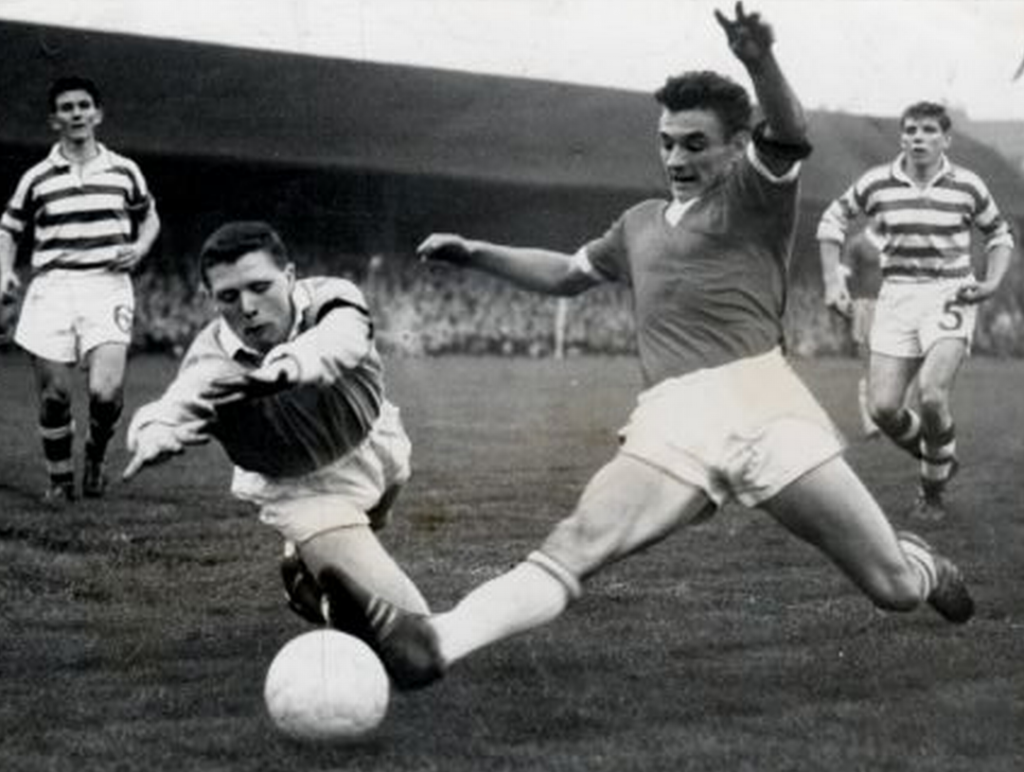
SAFE HANDS…Celtic keeper John Fallon prepares to pluck the ball off the toe of an opponent as Bertie Peacock (No.6) and John Kurilla look on.
I lost count of the number of keepers who came and went in those years. Jock could make up his mind in an instant about an outfield player, but he definitely swithered over goalkeepers. It was rather ironic that the No.1 who was his most consistent by far was Ronnie Simpson, who, of course, was transferred to Celtic by Jock when he was manager of Hibs.
Jock made some fairly strange decisions when it came to picking his keepers. I recall he played three different goalies in three consecutive games back in September 1965. He fielded Fallon in an 8-1 League Cup quarter-final win over Raith Rovers and a week later an Irishman called Jack Kennedy played in the second leg which we won 4-0. Three days after that Ronnie was between the sticks in an emphatic 7-1 triumph over Aberdeen.
Folk often said if Jock had an Achilles Heel it was over his last line of defence and they may have something there. By the way, that bloke Kennedy never played in the first team again. He is the only goalkeeper in Celtic’s history who never lost a goal. What a claim to fame!
At least, he had a bit more luck than a certain Dick Madden who made his debut in a league game against Kilmarnock at Rugby Park in March 1963. I was with Birmingham City at the time and I gulped when I saw the result in my local newspaper. It read: Kilmarnock 6, Celtic 0.
I don’t know if the keeper was to blame, but he, like Kennedy, never played again. It wasn’t all bad news for Madden, though, because his family won the football pools that week. I heard that one of his team-mates said to him, ‘Why don’t you buy a pub, Dick? You could call it The Lets Six Inn!’ Footballers can be so cruel.
Big Jock used to take great pleasure in putting his keepers through the mangle in training. I recall a training session when we were down at Largs preparing for our 1965 Scottish Cup Final. Fallon was in the man in possession and training pre-Jock was a fairly gentle work-out for the keepers.
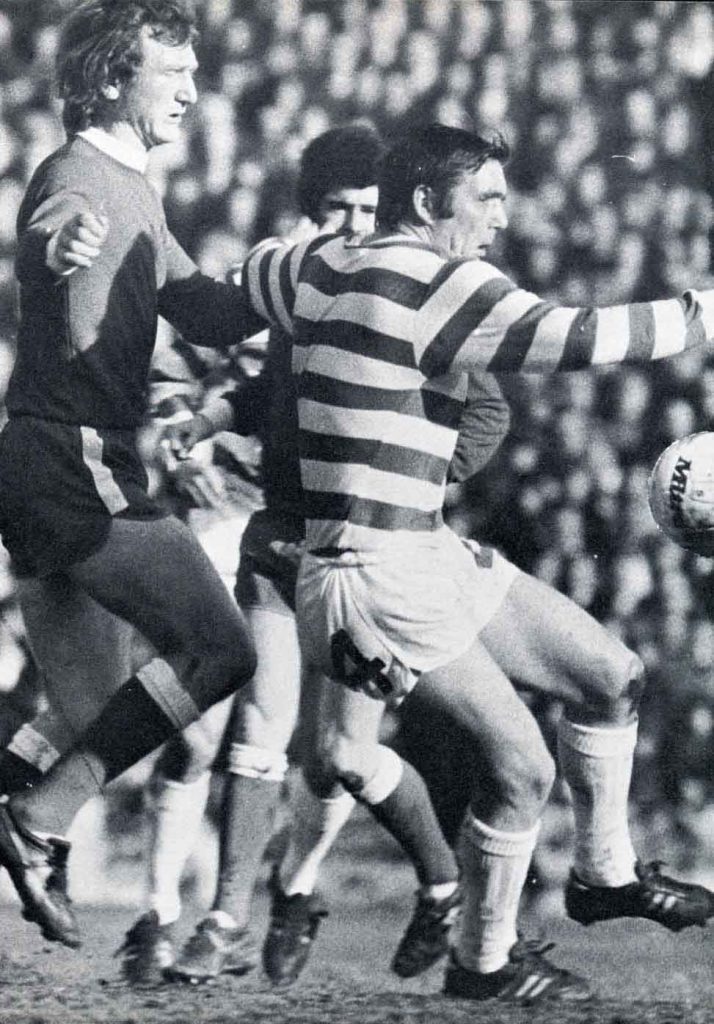
I’M IN CHARGE…Bobby Murdoch takes control as Aberdeen duo Davie Robb and Steve Murray challenge.
There could be a lot of larking about, but Fallon’s face was a picture when Jock grabbed one of these huge nets filled with balls and said to him, ‘Right, let’s you and I go out for some practice.’ And he put the keeper through all sorts of punishment as he belted balls at him from all angles for over an hour. Fallon probably saw as much action in that session as he had all season playing in the first team.
My old midfield mate Chopper, Bobby Murdoch, didn’t have too much of a say in the matter, either, when the end came for him at the club. Jack Charlton, then the Middlesbrough manager, phoned Jock to ask if he knew of any middle of the park players who might do a job for his club. He must have thought our boss was joking when he replied, ‘Bobby Murdoch’s your man. He’ll do you a turn.’
The Boro gaffer could hardly believe his ears. Jock was prepared to let him go for nothing. Chopper was only twenty-nine at the time and still had a lot of football left in him. He had played 484 games for the club and scored 105 goals. But Jock was starting to change the system at Celtic. He brought in players such as Stevie Murray, from Aberdeen. He had already signed Tommy Callaghan, from Dunfermline, a few years earlier. Murray performed on the right, in Chopper’s position, and Callaghan played on the left, in my position.
Both were entirely different types of players to Chopper and me. We preferred to pass the ball around, picking out team-mates from all sorts of ranges. Murray and Callaghan were runners with the ball. Jock had been toying with the idea of freshening things up and changes were in the wind.
Chopper, like so many before him, didn’t want to move. Celtic were his club and he must have thought he would bring down the curtain on a splendid career in the green-and-white hoops. Jock didn’t see it that way and Chopper was off to Boro where, I’m delighted to say, he had a wonderful career and helped bring through a young Scottish midfielder who listened and learned from my former colleague.
That youngster was Graeme Souness. Chopper also had a spell as manager of the club when Charlton moved on, but you always knew he hankered at ‘getting back up the road’, as he put it.
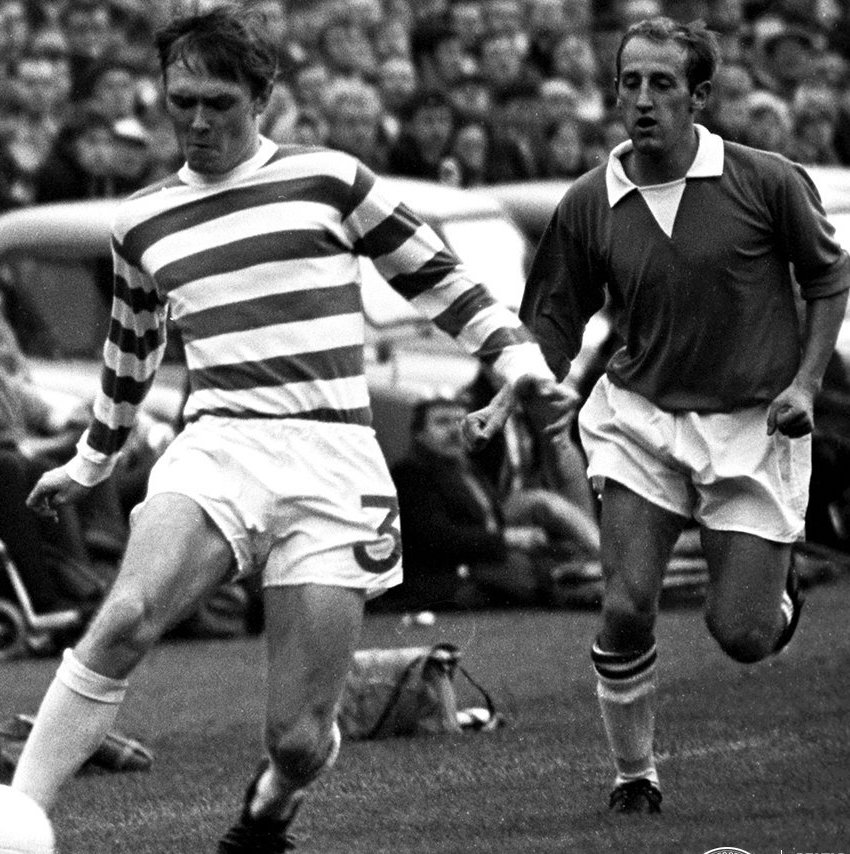
THE QUIET ASSASSIN…Davie Hay attacks on the right with St Johnstone’s Henry Hall too late to intervene.
Davie Hay, still a friend to this day, recalls being told by Jock it was time to go after he returned from a very successful World Cup Finals with Scotland in West Germany in 1974. Davie played really well in our games against Brazil (0-0), Yugoslavia (1-1) and Zaire (2-0). I remember he had gone on strike for better pay conditions earlier that season.
I think he was out for a fortnight and Jock tried to sell him to Spurs around that time. Davie was having none of it and said he had no intention of going. Now Davie Hay is not a greedy guy, I can tell you that. He wanted what he was worth, but Celtic, back then, weren’t interested. Davie told me he returned from the World Cup Finals and was ready to settle his differences with the club.
He admitted he had made that perfectly clear. He would accept what was on the table and get on with playing for Celtic. However, Chelsea had been alerted by his superior performances in West Germany and they had offered £250,000, a lot of money back then, for the versatile Hay. Celtic took it and Davie was told to report to Parkhead. The offices were closed, but Jock was waiting for him in his car at the front door. Davie was convinced Jock wanted to try to persuade him not to go. They sat in Jock’s Mercedes in the car park and Davie, one of the most honest blokes you are ever likely to meet, was told he was on his way this time.
He admitted he had been hurt that they were willing to let him leave – just as I was all those years ago when Birmingham City came on the scene. Davie did, indeed, go to Chelsea where I believe his wage packet soared from £65-per-week to £210. Wee Louie, Lou Macari, had gone to Manchester United the previous year for £200,000. Both would be followed by Kenny Dalglish, who went to Liverpool in 1977 for a-then British record fee of £440,000.
George Connelly, a genius with the ball, was lost to the game altogether as he quit with off-field problems. I think he was twenty-six years-old at the time. That was a travesty. But what a team Celtic could have had around that time if they had spent the money to keep these players at the club. They might even have won another European Cup or two. That wouldn’t have been out of the question with those guys around.

If Jock was ever hurt by having to release a player then he hid it well. Maybe he did these things in private, but there was never a public show of emotion. Once a player had served his purpose, it was time to move onto the next stage. Jock wasn’t slow to let you know there were other players out there who could come in and do a job in your position.
Back in the Sixties, our reserve team was known as The Quality Street Gang. They had fabulous youngsters such as Kenny, Davie, Louie and George as well as Danny McGrain, Vic Davidson and John Gorman.
They were all beginning to emerge and Jock liked to take them down to Seamill every now and again before a big European game to give them a taste of what it was like to be part of the first team squad. It also acted as a reminder that these guys would soon be knocking on the door and wanting your place in the team. It kept us all on our toes, believe me. A hint of complacency and you were out and they were in.
Jock always insisted, ‘A manager is as happy as his unhappiest player.’ So, Jock simply eliminated his unhappiest players. Anyone stirring it up would find his P45 coming towards him at the speed of light.
TOMORROW: Big Jock put the block on me getting top job. Bertie reveals all.

